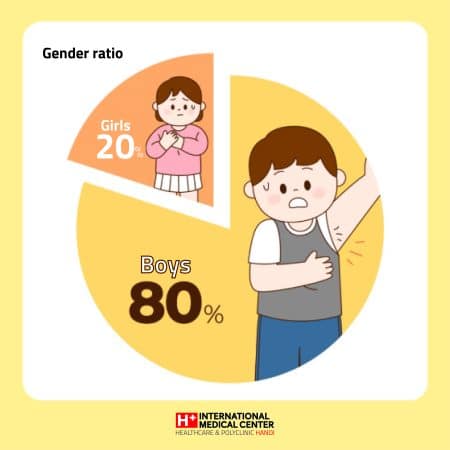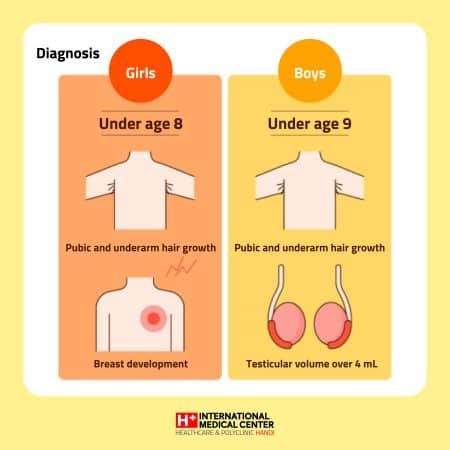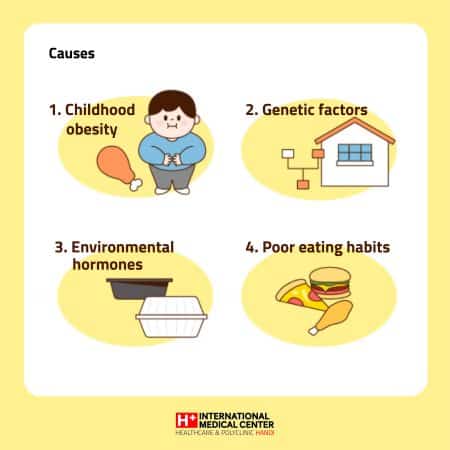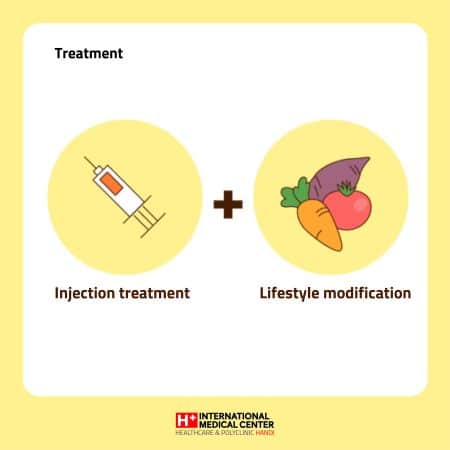As awareness around child development continues to grow, many parents are concerned about whether their children are growing at a healthy pace or developing earlier than their peers. In recent years, the number of children diagnosed with precocious puberty has been rising significantly. To better understand this condition, H PLUS International Medical Center invites you to explore the key information below.
What Is Precocious Puberty?
Precocious puberty refers to the early onset of puberty, which occurs when secondary sexual characteristics appear before the age of 8 in girls and before age 9 in boys. Girls are about 10 times more likely to develop precocious puberty than boys.
Globally, the prevalence of precocious puberty in children is increasing rapidly. A century ago, the average age of menarche in girls was around 16–17. By 2010, this age had dropped to under 13–14. In Vietnam, the National Pediatric Hospital reported only 14 cases of precocious puberty in the early 1990s. By 2024, this number had skyrocketed to 1,175 cases.
In girls, precocious puberty is identified by early breast development and pubic hair growth before age 8. In boys, it is defined by pubic hair before age 9 or testicular volume exceeding 4 ml.
Causes of Precocious Puberty in Children
Common causes include:
-
Childhood obesity: Increasing consumption of high-calorie, hormone-stimulating foods such as fast food, spicy or salty snacks, and late-night meals is a major factor. Increased fat cells lead to elevated leptin, a hormone that promotes the secretion of sex hormones, triggering early puberty.
-
Environmental hormone exposure: Pollutants such as pesticides, plastics, and metal cans contain endocrine-disrupting chemicals (EDCs) that are hard to decompose. These mimic or interfere with the body’s natural hormones, causing hormonal imbalances and potentially leading to early puberty.
-
Unhealthy lifestyle habits: Late-night use of smartphones, computers, and televisions disrupts sleep and reduces melatonin production — a hormone that helps regulate puberty. Poor sleep hygiene is a growing contributor to early puberty in children.
How Is Precocious Puberty Treated?
If diagnosed, children are typically prescribed hormonal injections to slow down puberty, administered every 4 to 12 weeks. Although some parents worry that treatment might hinder height growth, in reality, it helps preserve the child’s potential height by delaying premature closure of growth plates.
Lifestyle adjustments are equally important:
-
Limit high-calorie, processed, and stimulant-rich foods (e.g., fatty meats, fast food)
-
Increase intake of lean protein, fruits, vegetables, and white fish rich in minerals and fiber
-
Encourage regular physical activity to prevent obesity
-
Avoid screen time and digital devices before bedtime to promote quality sleep
Professor Lim In-seok, an Honorary Professor in Pediatrics and Adolescent Medicine at H PLUS Yangji Hospital (Korea), shared:
“Treatment for precocious puberty aims to reduce the risk of associated medical conditions and alleviate emotional stress by moderating a child’s rate of development.”
He added:
“If there are any concerns about a child’s development, early screening through pediatric evaluation and timely treatment is critical.”
Emotional and Physical Impact on Children
Precocious puberty affects both the body and mind.
-
Girls may experience menstruation at a very young age, facing significant emotional and social pressure.
-
Boys may display aggressive or rebellious behavior due to hormonal imbalance.
-
Although children may grow taller early due to an initial surge in sex hormones, the premature closure of growth plates can result in a lower final adult height than expected.
If you have any questions or concerns regarding your child’s development, H PLUS is here to provide expert guidance and personalized pediatric care.
📞 For consultation and appointments, please contact our hotline: +84 24-7306-9889.
H PLUS is committed to supporting families with advanced diagnostics, experienced pediatric specialists, and comprehensive treatment solutions — helping children grow strong, healthy, and happy.
—
 +84 24-7306-9889
+84 24-7306-9889  Booking
Booking 






